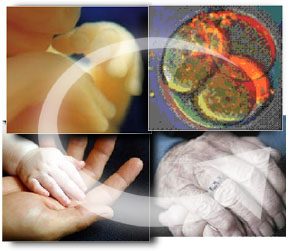Three-Parent Embryos: Reproductive Human Cloning to Produce Genetically Modified Babies

3Parent-BDFBioethicsBriefingFINAL – Combined Legal Briefing and Science White Paper
3Parent-CondicWhitePaper – White Paper by Maureen L. Condic, PhD with illustrations
3Parent-BDF2Pager – 2 page summary
February 19, 2015. Bioethics Defense Fund attorneys Nikolas T. Nikas and Dorinda C. Bordlee have created a BDF Bioethics Briefing on the subject of “three-parent” embryos setting forth both a legal memo and a science white paper with illustrations by Maureen L. Condic, PhD., Associate Professor of Neurobiology and Anatomy at the University of Utah School of Medicine.
Executive Summary
According to an article at Healthcarebusinesstoday.com, the BDF Bioethics Briefing focuses on an important yet seemingly overlooked reality in the debate surrounding the United Kingdom’s proposed regulations allowing mitochondrial donation, also known as “three-parent embryo” procedures. In specific, the UK government’s proposal to allow the “pronuclear transfer” method is, in fact, a proposal to allow a eugenic form of reproductive human cloning, i.e. cloning to produce genetically modified children.
The proposed regulations also allow “maternal spindle transfer” to create human embryos intended to be transferred to a woman’s womb. While that particular method does not involve human cloning, it does cross bioethical and legal boundaries by allowing the genetic modification of human beings and the creation of designer babies.
Conclusion: Unless the Parliament of the United Kingdom acts to reject the proposed “Mitochondrial Donation” Regulations, it is likely viagrageneriquefr24.com acting ultra vires to protect what is commonly known as reproductive human cloning in violation of the laws of the United Kingdom, European law, and the United Nations Declaration on Human Cloning (2005). It is also likely in violation of laws forbidding genetic modification of human beings.
The BDF Bioethics Briefing Paper includes two parts: (1) a legal and policy briefing by Bioethics Defense Fund (“BDF”), a public interest law and policy organization that provides legal consultation on bioethics policy issues in the United States and abroad; and (2) a scientific white paper with illustrations prepared for the members of the United Kingdom’s Parliament by Maureen L. Condic, Ph.D.
(1) Law and policy briefing
The law and policy briefing sets forth a non-exhaustive survey of some of the legal provisions that seem to be contravened.
- In short, this memo concludes that the proposed regulations allow techniques that all involve the unlawful creation of genetically modified human beings, with some forms of the technique involving the unlawful cloning of human beings to produce children (“reproductive human cloning”).
- The memo also raises issues regarding potential tort claims based on birth defects of live-born children, as well as ethical concerns surrounding the risk of coercive abortion of unborn children detected to have adverse health conditions.
(2) Science briefing
A scientific white paper prepared for the UK Parliament by Maureen L. Condic, Ph.D. is attached to the BDF Bioethics Briefing. Dr. Condic’s white paper sets forth the mechanics of the three procedures revealing that two involve reproductive human cloning (Section I), the serious health risks to the children intended to be born (Section II), and some of the serious ethical concerns that have not been adequately addressed (Section III). As explained by Dr. Condic:
Whatever the purported justifications, public officials considering the legalization of these methods of genetic engineering should clearly understand the science showing that:
- all three procedures involve genetic modification, i.e. “modifications to the subject’s germ line genetic identity”;
- all three procedures carry significant risks to the children intended to be born; and
- two of the procedures involve a eugenic form of reproductive cloning, in which a human being with a medical condition is killed and his or her parts are used to create a new human being with an intended improved biological state.
View the BDF Bioethics Briefing, 3-Parent Embryos: Reproductive Human Cloning to Produce Genetically Modified Babies
3Parent-BDFBioethicsBriefingFINAL – Combined Legal Briefing and Science White Paper
3Parent-CondicWhitePaper – White Paper by Maureen L. Condic, PhD with illustrations
3Parent-BDF2Pager – 2 page summary
The BDF Bioethics Briefing is presented in collaboration with Dr. Maureen L. Condic in her individual capacity; it does not represent the views or opinions of the University of Utah or its employees.
See The Human Fertilisation and Embryology (Mitochondrial Donation) Regulations 2015, available at http://www.legislation.gov.uk/ukdsi/2015/9780111125816/contents.
Bioethics Defense Fund is a national public-interest organization that puts law in the service of life via model legislation, litigation and public education.

















